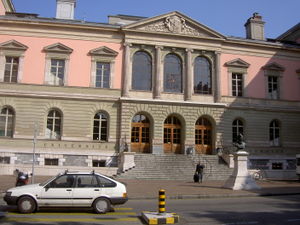University of Geneva
| University of Geneva | |
|---|---|
| Université de Genève | |
 |
|
| Latin: Schola Genevensis | |
| Established | 1559 |
| Type | Public university |
| Rector | Prof. Jean-Dominique Vassalli |
| Students | 13,364 |
| Location | Geneva, Switzerland |
| Affiliations | Coimbra Group LERU EUA |
| Website | www.unige.ch |
The University of Geneva (French: Université de Genève) is a university in Geneva, Switzerland.
Founded by John Calvin in 1559 as a theological seminary that also taught law, it remained focused on theology until the 17th century, when it became a center for Enlightenment scholarship. In 1873 it dropped its religious affiliations and became officially secular. Today, the university is the second-largest university in Switzerland. It has programs in many fields but is especially noted for its programs in international relations (with Geneva being a center for many international organizations), law, scientific research (with a record of notable discoveries in planetary science and genetics) and theology.
Classes are taught mainly in French. The university pursues three missions: teaching, research, and service to the community. It was ranked number one generalist university in continental Europe, thirty-second world wide among the "Top 100 Global Universities" by Newsweek in 2006 and 81-83rd worldwide by the Global University Ranking in 2009.[1] The university is a member of the League of European Research Universities.
In 2009, the University of Geneva has celebrated the 450th anniversary of its birth, through a wide range of public events.
Contents |
Degree system
Before 2005, the University applied the French education model of granting academic degrees, with some minor differences: demi-licence (two years), licence (four years), diplôme d'études approfondies and diplôme d'études superieures spécialisées (DEA/DESS) (1–2 years), and doctorate (3–5 years). The University now follows the requirements of the Bologna process: bachelor's (three years), master's (1–2 years), Master of Advanced Studies (1–2 years), doctorate (3–5 years).
Organization

The university is composed of eight faculties:
- Faculty of Sciences (natural sciences)
- Faculty of Medicine (medical school)
- Faculty of Arts (arts)
- Faculty of Economics and Social Sciences with studies including business school (Haute École Commerciale - HEC), economics, sociology and international relations)
- Faculty of Law (Geneva Law School) (law school)
- Faculty of Protestant Theology (Protestant theological school)
- Faculty of Psychology and Educational Sciences (psychology and education)
- School of Translation and Interpretation (translating and interpreting)
The university has also developed a continuing education programme. The university has a partnership with the nearby Graduate Institute of International and Development Studies and the Bossey Ecumenical Institute, and students at the university may take courses at these institutes.
Inter-faculty centers:
- Institute for Reformation History (the Reformation)
- Computer Science Department (computer science)
- University Centre for Study of Energy Problems (energy policy)
- The European Institute of the University of Geneva (European studies, European integration)
- Interfaculty Center of Gerontology (gerontology)
- Swiss Center for Affective Sciences (affective science)
- Center for Environmental Studies
- Geneva Finance Research Institute
Trivia
On the 2009 THE–QS World University Rankings list, the University of Geneva was ranked inside the top 200 for the fifth consecutive year. An overview of the last years:
| Year | Rank (Change) |
|---|---|
| 2005 | 88 |
| 2006 | 39 ( |
| 2007 | 105 ( |
| 2008 | 68 ( |
| 2009 | 72 ( |
Notable scholars
|
|
|
Notable alumni
|
|
|
References
Interanl Articles
- myScience.ch - The Swiss Portal for Research and Innovation
External links
|
|||||
|
|||||
|
|||||